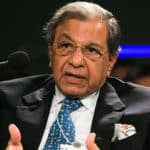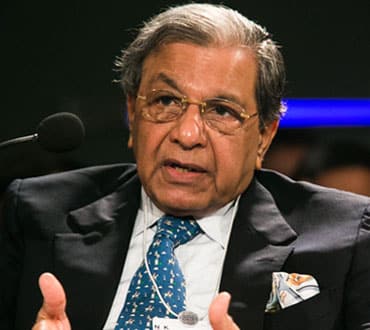April 12, 2021 | Columbia University


On April 9, 2021, USISPF and the Raj Center at Columbia University hosted N.K. Singh, the Chairman of the Fifteenth Finance Commission, for a discussion on the federal polity of India, India-US relations, and the farmers’ protests. The session was moderated by Dr. Arvind Panagariya.
Singh explained that India is a union of states, rather than a confederation. The evolution of the same is marked by the Government of India Act of 1919, followed by the Government of India Act of 1935. The federation of states has been clearly defined in the constitution. The 7th schedule of the Constitution defines subjects that are the domain of states, subjects under the central government, and concurrent subjects with the Indian parliament’s decision being binding. The classic distribution of subjects between the union list, states list, and concurrent list has faced many challenges. For instance, education was a subject that was transferred to the concurrent list leading to the enactment of the Right to Education act. Employment was a subject in the states list, however, that too was transferred to the concurrent list when the parliament implemented the MNREGA. The distribution of subjects has made it difficult to address issues such as natural disasters as it has become unclear who is responsible for spearheading the crisis response. In the past half century, most centrally sponsored schemes had previously happened to be under state domain but were undertaken through the mutual consent mechanism exercised under Article 282 of the Constitution. In the report put forth by the Fifteenth Finance Commission, Singh stressed that the 7th schedule and use of Article 282 must be reviewed.
Explaining the history behind the finance commission, Singh stated that between 1949 and 1951, an interim finance commission was created which attempted to resolve issues surrounding what percentage of union tax revenue should go to the central and state governments – an issue that cropped up once again when India created the Goods and Services Tax (GST) Council, a permanent body to look into indirect taxes and manage the newly adopted GST. Furthermore, Singh said that the Finance Commission has submitted its report to the President who has accepted their recommendations. Accordingly, the Finance Commission has suggested fiscal reforms to increase the tax-to-GDP ratio, through an overhaul of the GST. The share of taxes to be devolved to states, including Ladakh and Jammu & Kashmir, has remained at 42%. The shares of taxes to individual states were then determined through a careful consideration of geographic area, forest cover, demographic management and tax effort to judge performance, equity, efficiency, and needs.
Dr. Panagariya asked Singh regarding agriculture market, which was historically a state subject. For the same, reforms have been ongoing since 2003 to assuage the plight of small farmers. He further added that every country that has gotten richer and more developed has done so because of moving workers away from farming. Singh lauded the farm laws for creating more options available for farmers to select the best person and price to sell their produce. He mentioned Bihar as a state that is reaping the benefits of eradicating the APMC. He cited the goal of the agriculture reforms as raising productivity in the agriculture track, adding that these reforms were the beginning of much more comprehensive agriculture reforms. The finance commission report has articulated areas of reform including diversification of cropping, water conservation patterns, and improvement of agricultural exports. The report also deals with urbanization, whereby resources assigned to states have been tied to some performance criteria via urban local bodies. Since urbanization is an important indicator of growth, cities have been classified by population between 1m+, 100k to 1m, and cities below 100k. This will incentivize the creation of new cities and spur urbanization.
Dr. Panagariya expressed doubt over centrally sponsored schemes whose progress is hard to track and questioned whether such schemes should be continued. Singh stated that all schemes will have a sunset clause, to be reviewed regularly so as to make sure that resources are not being wasted. He said that the report exercises for deep rationalization of state sponsored schemes, including the closure of many poor functioning schemes.
Speaking of India and the US, Singh said that the bilateral relationship has strengthened through the years. He mentioned the meeting between John Kerry, Special Envoy of Climate, and Prime Minister Narendra Modi as indicative of the countries’ strong ties on matters of renewable energy, green technology, health related infrastructure, and the deepening and diversification of the new partnership of the Quad. Dr. Panagariya brought about India-China relations, further adding that while he had advocated for India to be a part of RCEP, that confidence and level of trust had declined after the tragic skirmish between soldiers in Galwan Valley. Singh responded saying that India must not distance itself from China through embargo or such but through deeper connections with the US and the Quad, as well as active policies to enhance India’s productivity and defense capacity.
Responding to the probability of the US imposing sanctions on the delivery of the 1st battery S-400 missile Russia system, Singh stated that there was an ongoing dialogue to clarify the necessity of the system for India. On the topic of defense, he added that India must create a non-lapsing fund to generate resources to impart predictability and certainty for capital expenditure of defence, so states do not pay through a cess or sub-charge. Answering questions about the lessons learned from GST rollout, Singh admitted that he would prioritize simplicity, simplify risk and find one revenue neutral rate, one de-merit rate, and one merit rate. He also said that he would try for more predictability and greater robustness in the tech platform. Speaking of the reformulations in urban interconnectivity infrastructures in light of the pandemic, he said that there would be special initiatives from the incubation fund and the Pradhan Mantri Gram Sadak Yojana to promote the creation of new cites Lastly, touching upon the nation’s dependence on fossil fuel revenues, he stressed that we need to move away from fossil fuels dramatically, re-calibrate of the entire structure to allow market forces more leeway, and have systems of connectivity and storage with the grid. Singh added that both the India and the US are ready to meet these daunting challenges.





